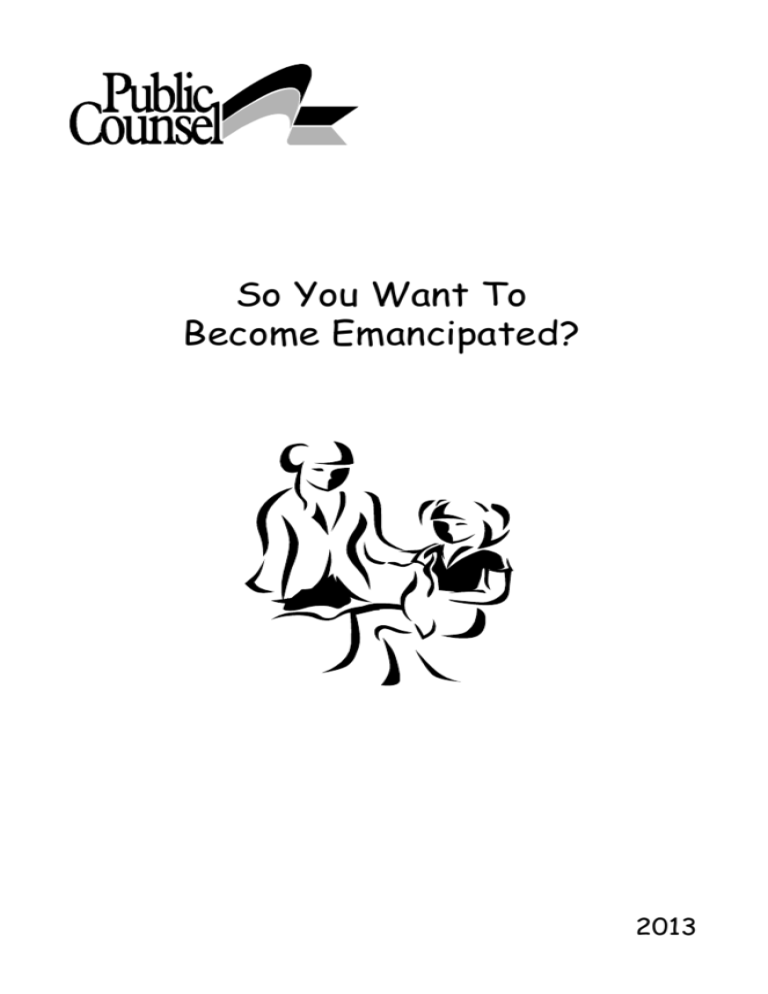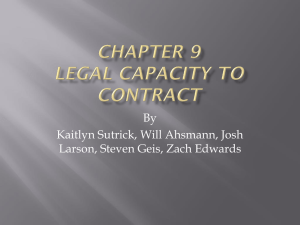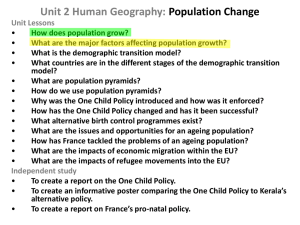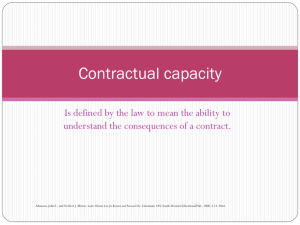
So You Want To
Become Emancipated?
2013
Emancipation
WHAT IS EMANCIPATION?
Emancipation is a way you legally separate from your parents or guardian, before you turn 18 years old. Some people call this a “divorce” between you and
your parents or guardian, and like divorce, emancipation may improve or strain
the personal relationship you have with your parents, guardian or other family.
Once you become emancipated, you free yourself from the custody and control of
your parents or guardian. You also give up the right to have your parents or your
guardian support you financially. At the same time, you gain the right to control
most BUT NOT ALL aspects of your life.
How Will My Life Change If I Become Emancipated?
Emancipation changes your relationship with your parents or guardian, and your
relationship with public agencies Specifically;
● You will lose your right to have your parents or guardian financially support you for your basic living expenses and health care.
Note: Becoming an emancipated minor does not automatically
make you eligible for public benefits.
● You may be held legally and financially responsible for any injuries you cause to others.
●
You will gain the right to handle your own affairs. For example, you will be able to:
►
Live where you choose
►
Sign binding contracts (such as mobile phone plans)
►
Keep and spend your own earnings
►
Get a work permit without your parent’s consent
►
Sue someone in your own name
►
Consent to all of your own medical, dental and psychiatric care
►
Stay out as late as you want
►
Sign up for school or college
-1-
What Will Not Change If
I Become Emancipated?
Certain laws always apply to you as a minor, even after you become emancipated:
● You Must Go To School. Education laws require you to stay in school until you graduate from high school or turn eighteen.
● You Cannot Work As Many Hours As You Want. You still have to follow all child labor laws and work permit rules.
●
You Are NOT EXEMPT from Statutory Rape Laws. If you have sex, you or your partner could get in trouble with the law, especially if there is a big age difference (unless you are married to your partner) or the relationship is abusive.
● You Cannot Drink Alcohol Legally. Even if emancipated, you may not legally drink alcohol until you turn twenty-one.
● You Cannot Vote. Emancipation does not lower the voting age. You still must be eighteen to vote.
Some Legal Rights You May Not
Realize You Already Have
YOU DON’T NEED TO BE EMANCIPATED
TO GET SOME KINDS OF HEALTH CARE!
Even if you are living with your parents and are not emancipated, you can get
some kinds of health care for free without anyone informing your parents. This
health care program is called “Medi-Cal Minor Consent Services.” It covers
-2-
family planning, birth control, abortion, and pregnancy care, as well as treatment
for drug or alcohol problems, mental health problems, sexually transmitted
diseases, rape and sexual assault. You can apply for Medi-Cal Minor Consent
Services at health clinics, family planning clinics, or county welfare offices.
So, if you are thinking about emancipation just to get health care, you may want
to see if you can get the care you need without having to be emancipated.
Do I Qualify for Emancipation?
There are three ways you may become emancipated:
1. If You Are Married. Note that because you are under eighteen you must get the written consent of your parents or guardian and a court order if you get married before you turn eighteen.
2. By Enlisting In The Armed Services. Note that your parents and the armed forces must give you permission to enlist if you are under eighteen.
3. By Going To Court And Having The Judge Declare You Emancipated (“Judicial Declaration”). To use this method for emancipation, you must first satisfy the following six requirements:
a. You must be at least 14 years of age at the time you begin to seek legal emancipation.
b.
You must NOT be living with your parents or legal guardian. The court wants to be sure you have made a living arrangement where you plan to stay indefinitely. In other words, they want to
see more than a temporary address. Saying you are “staying with a friend” is not enough.
c.
Your parents or legal guardian must have consented or
acquiesced to your living away from them. Parental consent is generally required for a teen to become emancipated. This can be
shown in two ways. One way is to get your parents to sign a
consent and attach it to the Petition for Emancipation. If your parents sign this form, it may be easier for you to become
emancipated. If your parents won’t sign this form, you maybe
able to show the court that your parents have “acquiesced.” If
you are living away from home and your parents know all about this but they are not strongly objecting or trying to bring you back home to live, a judge MAY interpret their lack of action as
“acquiescence” or agreement to your living arrangement.
-3-
d.
You must manage your own financial affairs. The court needs to be sure you have income earned only by you and that you make
the decisions on how that income is spent. You will need to show evidence that you pay your own bills, especially for such necessary things as housing, food and clothing. It is best if you can show that you actually use your money for the things you need. Even if you could argue that you trade housework for room and board, it is better
if you can arrange to receive money for the work you do and then use that money to pay rent. While there is no set amount of money
you must earn, the judge will examine your finances closely to make certain you make enough money to pay for expenses. Some judges may deny your request to be emancipated if your only source of income is welfare (CalWORKs).
e. Your source of income must be legal. This means you must not earn your living from criminal activities.
f.
The emancipation must be in your best interest. This requirement allows the judge a great deal of freedom in deciding whether to declare you emancipated. Even if you meet the other five requirements, a judge who feels it is not in your best interest to become emancipated can deny your petition. In court, your parents or anyone else may object to your emancipation and try to persuade the judge that it is not in your best interest.
Myths About Emancipation
I heard that if a girl has a baby, she is automatically
emancipated when she gives birth. Is this true?
ABSOLUTELY NOT! Having a baby does not mean you are automatically
emancipated. Any teen under 18 who has a baby must still legally live with her
parents or guardian. Also, if you need cash aid, the law says you must live with
a parent or relative, or in an adult-supervised program such as a group home.
But this rule does not apply to Medi-Cal or Food Stamps and there are exceptions. For example, if you or your child’s health or safety would be at risk if
you lived with a parent, or you have already lived apart from your parents for
12 months. If you need cash aid and don’t live with a parent or relative, ask the
CalWORKs eligibility worker to refer you to a MINOR PARENT SERVICES
caseworker to see if you qualify for one of the exceptions.
-4-
My parents say they want me to be emancipated.
Can they do that?
NO. There are some parents who would like their child to be emancipated
because it means the parents are no longer legally responsible for providing
financially for their child. However, emancipation is meant to be an improvement
in your life, not a way for parents to get out of their responsibilities.
Maybe, you aren’t really sure you want to
make such a big change in you life.
SOME THINGS TO THINK ABOUT
►
Be sure you can realistically support yourself without financial help from your parents (including health insurance) as emancipation means
giving up your rights to parental support.
►
When considering emancipation, you should think about worst case scenarios such as job loss or illness that might prevent you from
working or taking care of yourself.
►
There is a way of undoing emancipation after it has been granted. However, you should think of emancipation as a permanent situation when you are deciding whether or not to file a petition.
-5-
►
Here are some questions you should consider: Have you given up on trying to make your relationship with your parents work? Are you
willing to risk having a complete break with them, that could be
permanent, and perhaps upset other family members as well?
►
Keep this in mind: All teenagers become “emancipated”on their 18th birthday without filing a petition or going through this process.
►
So take your time in making this decision.
If you will be 18 in six months or less, there isn’t time to complete the court process which takes four to six months.
Steps for Emancipation
If you decide emancipation is the right option for you, you must go through some
specific court procedures. If you (1) meet all the requirements outlined above
and (2) have lived in Los Angeles County for at least 6 months, you can file for
emancipation at the Juvenile Division of the Superior Court of Los Angeles. The
emancipation forms and procedures are fairly simple and you can than prepare on
your own. You do not need a lawyer, but if you are having a hard time, you can
call Public Counsel at (213) 385-2977 ext. 500 to ask for help.
This section of the brochure will walk you through some of the necessary
steps for filing an emancipation petition. The court materials will also
provide explanations for you to follow.
1.
Obtain the necessary forms. Emancipation forms are free at the Children’s Court Clerk’s Office at 201 Centre Plaza Drive, nd
2 Floor, Monterey Park, Los Angeles, California 91754; telephone
(323) 526-6600. You can also download the forms for free at http://www.courtinfo.ca.gav/delfhelp/family/emancip/emanforms.htm.
2.
Complete the forms. The court packet will contain the forms you need, along with detailed instructions on how to complete
them. Be prepared to explain why you want to be emancipated.
You must complete the following forms:
(See the Appendix for a complete set of forms)
-6-
•
Petition for Declaration of Emancipation of Minor, Order Prescribing Notice, Declaration of Emancipation, and Order
Denying Petition (MC-300) (See Appendix B)
•
Emancipation of Minor – Income and Expense Declaration (MC – 306) (See Appendix C)
•
Notice of Hearing—Emancipation of Minor (MC – 305)
(See Appendix D)
•
Declaration of Emancipation of Minor After Hearing (MC – 310)
(See Appendix E)
•
When you file these forms, you will be charged a $395.00 filing fee. If you are unable to pay this fee, you can apply for a
waiver of court fees and costs. If you need to do this, complete both the “Application for Waiver of Court Fees and Costs” and the “Order on Application for Waiver of Court Fees and Costs.” (See Appendix F)
•
Caution! You should realize that applying for a fee waiver may influence your chances of becoming emancipated. Some
judges might feel you aren’t really able to manage your
financial affairs if you can’t pay the court fees, while other judges may see the same situation as a worthwhile plan you made to use your money for daily necessities. A possible
compromise is for you to apply to waive only a part of the fees and pay the rest yourself. You can call the Children’s Rights Project at Public Counsel for help.
3.
Emancipation Checklist. (See appendix A) In addition to the Court forms, you will need to provide the Court with the documents in the
emancipation checklist, which is also in the appendix of this booklet.
These forms include your birth certificate, social security card,work permit, and last report card from school. If some of the documents on
the Emancipation Checklist, like a “headshot” or a “trust account
statement” are not things that you have, you will just want to write that you do not have these things. Please note, these documents must be
filed with the Court as part of the Petition for Emancipation.
4.
Consent to Emancipation. If your parents are agreeing to your emancipation, they need to sign a consent form in front of a professional
called a notary public. We have provided a sample consent form in
appendix D for your use. Once this form is signed in front of the notary public, you will want to attach it to the Petition for Declaration of
-7-
Emancipation of Minor (See appendix B) and file it with the other
court forms.
You may find a notary public in the ways listed below:
1)
To locate a Notary Public in your area, you may go online to
www.thenotarylist.com or www.123notary.com. You can also dial
(888) 838-1458. By providing your zip code, you will receive a list of notaries in your area.
2) You may check with your local Court House to see if they have a notary public on site.
3) You may also visit any UPS store near you or log on
www.theupsstore.com and ask if that particular office provides notary services.
By law for any notarization conducted, the notary public may only charge
$10.00 per signature. So, if the document you need notarized requires you to
sign two times, you will be charged $20.00. If you only need to sign once, then
you will be charged $10.00. Now if you request that the notary come to your
home to perform the notarization, then the notary has a right to charge mileage fees.
5.
File these forms with the Court. Take the completed forms to file at the Clerk’s Office of the Children’s Court, Juvenile Court Services, at
201 Centre Plaza Drive, Monterey Park, Room 280 on the second floor. Unless you are applying for a waiver of court costs and fees,
you must pay the $395.00 filing fee by check, cash or money order. The current judge handling emancipation cases is Judge John Henning
but you will want to contact the Clerk at the Judge Hennings’ Courtroom: (323) 526-6421 to make sure this will be the judge handling your case.
6.
Hearing on the Order Prescribing Notice. (See Appendix B) After the clerk has filed your petition (the form you fill out and sign for he
court), the petition goes to the court for review. The court will then decide whether to have a hearing. If the court decides not to have a hearing you will be notified by mail. If there is to be a hearing, the court will decide who must be officially notified that you filed a Petition for
Emancipation so they can appear at the court hearing on your Petition and state their opinions as to whether or not you should be emancipated.
Your parent(s) or legal guardian will have a right to receive official notice of the proceedings, as will the Department of Children and Family
Services or the Probation Department if they are supervising you.
-8-
BEFORE YOU FILE YOUR PETITION WITH THE CLERK, your parent
(s) or legal guardians may give up (waive) their rights to be given notice of
the proceedings by signing certain forms. If your parents give up their right to
be notified, and if the court also is satisfied that it is in your best interest to be
emancipated, the court can declare you emancipated. So, you can see that
getting the waiver signed can really speed up the emancipation process.
If you did not get waivers of notification signed, the court will set another hearing
date in about four to six weeks. This gives you time to notify people through the mail
and to plan on appearing at the hearing if they want their opinions heard in court.
7.
Hearing on Emancipation. You must appear at the time and place set by the court for the emancipation hearing. Be on time.
The judge will probably ask you to testify (talk in Court). He may ask you why you think you are doing well enough to be in charge of your
own life and may even ask you to explain some recent decisions you have made. There is no need to worry about these questions as the
judge is just trying to make sure that the emancipation is really in your best interest. All you need to do is answer the questions honestly.
The judge may also ask your parents to speak in Court. Be sure you
are prepared to respond to any issues your parents may have with you being emancipated.
You can also bring other witnesses, like a landlord, employer, or
teacher, and any other responsible adults to testify in your favor.
If you are under the supervision of the juvenile court, your probation officer or social worker will submit a report and recommendation to the court. After hearing the evidence, the judge will either grant or deny your Petition for Emancipation.
8.
After the hearing. Once the hearing has taken place and your petition has been approved or denied, both you and your parents will have an opportunity to challenge the decision.
•
If the petition is approved, you may obtain a certified copy of the
Declaration of Emancipation at the Clerk’s Office on the second floor for $25.00 plus the cost of the copy. You may then take the certified copy of the Declaration of Emancipation to the Department of Motor Vehicles (DMV) where you can get a new I.D. card to show you are Bring an additional copy of all of the documents that you filed with the court, which should include proof that you are in school, proof of your earnings or income, like pay stubs, and a list of your expenses.
-9-
emancipated. You must complete an emancipated minor’s application to California Department of Motor Vehicles (Form MC-315). You will be able to present this I.D. card to future landlords and employers or others to prove that you are an emancipated minor.
•
If the emancipation petition is denied: The law gives you the right to file a different petition (an official written request) for what is called a
writ of mandate. This means a different judge must be allowed to review the decision and may overturn it.
•
Your parents also have the right to petition for a writ of mandate if the emancipation was approved. If they oppose approval of your petition, their application for a writ of mandate will also result in your petition’s
review by a new judge with, possibly, a new decision. However, they can only petition for this review if they did appear at the court hearing and did state they were against your emancipation.
The Bottom Line!
As you can see, emancipation is a fairly complicated process. There are lots
of things to think about and requirements to fulfill before a court decision
can be made. It is a natural and common experience if you are considering
emancipation, to have mixed feelings about it and to go back and forth many
times while trying to decide whether to bring up the subject with your family
and whether to start the emancipation process.
Assistance
If you have any questions about the emancipation process in Los Angeles or would
like assistance, you can call the Children’s Rights Project at Public Counsel,
213/385-2977 ext. 500 or 800/870-8090 ext. 500.
For emancipation forms and instructions visit the California courts self-help center at: www.
courtinfo.ca.gov/selfhelp/family/emancip. See the Appendix for a complete set of forms.
Additional Resources
•
Teen Line: . . . . . . . . . . . . . . . . . . . . . . . . . . . . . . . . . . (800) TLC-TEEN
(800) 852-8336
•
Youth crisis line (24 hours): . . . . . . . . . . . . . . . . . . . . . (800) 843-5200
•
211 LA County: . . . . . . . . . . . . . . . . . . . . . . . . . . . . . . . . . . . Dial 211
For shelter and counseling information.
-10-
Appendix A
EMANCIPATION CHECKLIST
Documents needed from applicant:
1. _____ Photo identification
2. _____ Birth certificate
3. _____ Social security card
4. _____ Last report card from school
5. _____ Work permit
6. _____ Last pay stub or letter from employer verifying your salary, working hours and employment status (full of part time)
7. _____ Cecking and/or saving account statement
8. _____ Trust account statement
9. _____ Medical provisions (medical insurance card)
10._____ Death certificate of a deceased parent
11._____ Headshot (minor in the entertainment industry)
12._____ Entertainment contract (Minor in the entertainment industry)
13._____ Letter from the minor stating why he/she wants to be emancipated
14._____ Letter from parent(s), address from both parents, legal guardian(s), or person(s) entitled to your legal custody willing to provide some support After The emancipation is granted
15._____ Notarized signature from parent(s), legal guardian(s), or person entitled to you legal custody if they are consenting to your
emancipation. (You man notarize the “Notice of Hearing” form
or notarize a separate letter)
16._____ Letter from adult and/or another minor, if the applicant is currently residing with or plans to reside with after the emancipation is granted the letter must include:
i. The reason
ii. Any verbal or written agreement or responsibility from the minor
iii. The date of birth and the date of birth and social security number of the adult and/or other minor (This number is for criminal background check)
17._____ Any reference letter(s) in support of the emancipation
18.______ The filling fee of $395.00 or the completion of the “application fee waiver of court fees and cost”
19.______ Miscellaneous
Public Counsel, the public interest law office of the Los Angeles
County and Beverly Hills Bar Associations, is the largest pro bono
law firm in the U.S., and also is the Southern California affiliate
of the Lawyers’ Committee for Civil Rights Under Law. Public
Counsel coordinates the contributions of thousands of volunteer
lawyers each year. Public Counsel serves those in need – such
as children and the elderly, literacy projects and low-income
housing providers, refugees and the homeless – by providing
legal representation and matching financially eligible clients with
volunteer attorneys.
While this publication is designed to provide accurate and current
information about law, readers should contact an attorney or other
expert for advice in particular case, and also consult the relevant
statues and court decisions when relying on cited materials.
The content of this brochure may be reprinted. Any adaptation or
translation of the contents of this brochure must be authorized by
Public Counsel.
You may find this booklet and other Public Counsel booklets at www.publiccounsel.org
(First click on “Practice Area” Second click on “Children’s Right Project” Third
click on “Publications.”)
© 2013 Public Counsel. All Rights Reserved
Public Counsel
610 South Ardmore Avenue
Los Angles, CA 90005
213.385.2977 ext. 500
or
800.870.8090 ext. 500
www.publiccounsel.org








